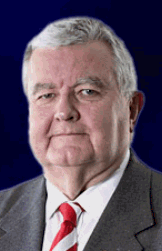|
|
|
|
|
|
|
News & Views item - August 2008 |
![]() ANU Vice-Chancellor Appointed to CSIRO Board. (August 12, 2008)
ANU Vice-Chancellor Appointed to CSIRO Board. (August 12, 2008)
 The
Minister for Innovation, Industry, Science and Research, Kim Carr, today
announced the appointment of Australian National University's vice-chancellor,
Ian Chubb (MSc DPhil Oxon), as a part-time member of the CSIRO Board.
The
Minister for Innovation, Industry, Science and Research, Kim Carr, today
announced the appointment of Australian National University's vice-chancellor,
Ian Chubb (MSc DPhil Oxon), as a part-time member of the CSIRO Board.
Senator Carr commented that Professor Chubb's "experience and expertise in the higher education and research sectors will be of great value to the CSIRO", which can be taken as a clear indication that the appointment of the outspoken vice-chancellor has been made to make the case for closer interactions between the organisation and the universities.
Professor Chubb was appointed ANU vice-chancellor in January 2001, having previously served as vice-chancellor of Flinders University from 1995 to 2000. He was trained as a neuroscientist, and after postdoctoral stints in Europe, took up a position in human physiology at Flinders University in 1977.
From 1986 to 1990, Professor Chubb was deputy vice-chancellor of the University of Wollongong; between 1990 and 1993, he was the full-time chair of the Higher Education Council, and from 1993 to 1995 he was the senior deputy vice-chancellor at Monash University. For part of that time he simultaneously held the position of foundation dean of the Faculty of Business and Economics.
He then returned to Adelaide when offered the vice-chancellorship of Flinders University.
One thing is certain, Professor Chub is his own man.
Note added August 13, 2008: Rosslyn Beeby in her Canberra Times article today says that Professor Chubb has flagged a determination to fight for more science funding in his new role as a CSIRO board member. He went on to tell her that scientists should be: "more outspoken and assertive," but agreed, "It can be a bit of a culture clash... Scientists are used to being appropriately cautious when explaining ideas, but these oral footnotes can be a confusing distraction to some audiences. They can give an impression of hesitancy, or of being unable to provide the information needed to complete a bigger picture. Sometimes people, including politicians, just want to hear a boldly stated idea thatís unencumbered by qualifications. In that respect, scientists need to be more outspoken and confident when putting their ideas forward."
That's problematic advice; it can lead to misunderstandings and unintentional misquotations and false conclusions by the lay media or public, ultimately leading to mutual mistrust. For an individual to be a good communicator doesn't allow him or her to over simplify to the point of being a party to misrepresentation.